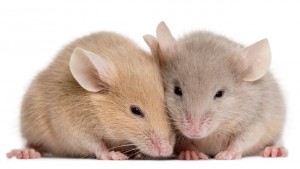Mice are friends. Mice have friends. Mice have feelings.
I must say again, I was attracted to an article due to the picture they featured. This time is was two mice snuggled up next to each other, and it was hard to resist.
Except this photograph then haunted me with everything I continued to read.
I’ve heard of the expression that goes along the lines of “They can smell the fear on you.” This probably has something to do with the pheromones that we give off. But I wasn’t aware that went for mice, too. Except they don’t smell fear. They smell pain.
I was on Sciencemag.org when I stumbled upon the cute little mice, and upon doing further research, I found the same study published on Sciencenews.org. These are both legitimate websites, and after seeing what it takes for a scientific journal to be published, I have some level of faith in what I am reading.
At the Oregon Science and Health University in Portland, a group of scientists found this out on accident. Andrey Ryabinin and her colleagues were studying the affects of alcohol withdrawal, which is apparently hard to test on mice. There experiment was a typical experimental/control setup. In the experimental group, mice had alcohol mixed in their water solution which was then taken away after a period of time. The control group was only given water. The results from this experiment were disappointing so they altered it, and decided to put the control mice in a different room. They also injected the mice in the experimental group with a molecule that induced pain.
The mice that were housed in a separate room experienced up to 68% higher pain sensitivity. The scientists thought that this might be due to stress, so they administered stress tests. The results from the stress tests made it clear that stress did not play an important role which lead them to smell. They took the bedding that was in the experimental group’s room and placed it in the control groups room, and a connection was made. The mice in the control room, who were not given alcohol and were not experiencing withdrawal felt the heightened pain sensitivity.
The really cool part about this accidental finding? It’s never been found before despite the clear extensive experimentation on mice. Furthermore, could humans also experience this same effect of shared pain? This is unclear, but this experiment will definitely spark more research into the question.
Reading this article also lead me to look into animal experimentation in general. I chose to live a vegetarian lifestyle for humane reasons. I don’t project my eating habits on others, but testing on animals is different. I used to think that the science that was being discovered was at least a strong enough pro that is relieved some of the darker aspects. However, upon taking this class, I wonder if that much science is being discovered. I also understand that some people will say that it is better to experiment on a mice than a human being, but I like to believe that all living creatures all equal and have equal value.
Sources:
http://www.bbc.co.uk/ethics/animals/using/experiments_1.shtml
http://www.sciencemag.org/news/2016/10/mice-feel-each-others-pain
https://www.sciencenews.org/article/mice-smell-share-each-others-pain


I referenced that experiment in one of my posts and used it as starting point to explain how dogs can sense a human’s pain. I think, in order to understand things and begin narratives on how animals act and interact, testing on them may be necessary. I don’t think it is ethical to test pain on animals, but mice are a different story. They seem like the most expendable animal ever. They are minimally productive and maximally reproductive. To have scientific findings, the pain of a few mice is a very reasonable consequence.